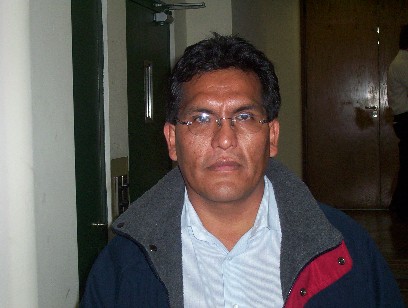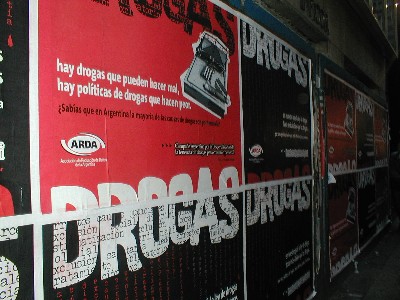Feature:
Judges
and
Legislators
from
Across
Latin
America
Call
for
Radical
Drug
Law
Reform
9/16/05
Attendees at last week's 1st Latin American Conference on Drug Policy Reform in Buenos Aires saw something rarely seen in North America: the active participation of judges, senators and congressman from across the continent calling for radical reform of the drug laws. While it not unexpected to hear from harm reductionists, cannabis advocates, and peasant producers at such an event, the participation of elected officials and judicial officers demonstrates that drug policy reform ideas, including legalization, have gained significant traction in Latin America -- more rapidly than that in the US, where the public official who will publicly identify himself with drug legalization or even drug reform is hard to find.
Not that the judiciary and the politicians south of the border have risen up in mass either. But in Buenos Aires last week an embryonic continental legislative and judicial movement for reform began to articulate itself. That's the way conference hosts the Argentine Harm Reduction Association and the anti-prohibitionist umbrella sponsoring the conference, REFORMA, planned it, creating within the larger conference the 1st Regional Symposium of Legislators and Judges on Drug Policy. The symposium brought in, among others, national legislators Deputy Raul Garcia and Senator Diana Conti from Argentina, Deputy Dionisio Nuñez Tancara from Bolivia, Deputy Pedro Arenas Garcia from Colombia, as well as judges Maria Luisa Karam from Brazil and her Argentine counterparts Martin Vazquez Acuña, Luis Niño, and Eduardo Freiler, and former Colombian attorney general Gustavo de Greiff, who gave the conference's opening address. The conference and symposium are a continuation of a recent organizing process that kicked with the DRCNet-sponsored Out from the Shadows conference in Mérida, Mexico in 2003, where many of the key players in REFORMA first met. Since then, Latin American drug reformers who came face to face in Mérida and others have congregated at the Global Social Forum meeting in Cartagena, Colombia, also in 2003, and a year ago this month at the Andean Amazon Forum in Popayan, Colombia, where REFORMA was officially born. "REFORMA wants to create a regional movement aimed at the UN conventions," said Marco Perduca of the International Antiprohibitionist League, also a leading sponsor of the Mérida gathering. While Mérida too had a substantial number of legislators on hand, the Buenos Aires conference marks the first time judges and legislators were made an explicit part of the continental reform effort. "The drug laws exist without justification," said de Greiff, who is now the honorary head of REFORMA. "In 40 years of drug war, they have not fixed the problem. To the contrary, they have created more evils. They are responsible for the corruption, the crimes of the drug traffickers, the deaths of innocents. And drug use has not diminished. In fact, it is easier to get prohibited drugs now than in the time of Richard Nixon, who began this war and imposed it on the world." While the legislators and judges reflected the varying concerns of their home countries, their encounter helped make clear that the problems they face -- whether with the repression of coca growing in the Andes, the drug-selling gangs who virtually control the favelas of Rio de Janeiro and Sao Paulo, the thousands of drug users crowding the jails of Argentina, the terrible war in Colombia, or the border violence as traffickers settle accounts in Mexico -- are all linked to the global drug prohibition regime. "Coca is the identity of the indigenous people of the Andes," said Bolivian congressman Dionisio Nunez Tancara. "The production and consumption of coca has been going on for three or four thousand years here, and we defend coca. These anti-drug policies have affected our Aymara and Quechua populations, as well as those in neighboring countries like Peru, Ecuador, and Colombia. We are very critical of these policies and of the UN conventions that support them," he told the audience. Nunez linked the Bolivian government's attitude to coca production to class. "When the production of coca was in the hands of the great landowners, the Bolivian state defended the production and consumption of coca, but after the land reform of 1952, when the great estates were broken up, the state abandoned its defense of the leaf. Now, the Bolivian government says the coca is destined for the drug trade." And Nunez linked current policy to the US government. "The Law 1008, which allows only for limited legal production in one area, was approved after only one debate, and it had to be translated from English into Spanish because it originated in Washington," he said. "It was imposed from outside. Now, in a coca growing village of a thousand people, we have four forts full of soldiers and police." But Bolivian coca growers organized and are about to see one of their own as president, said Nunez. "We created a campesino movement and we organized unions to defend our cultivation, and now the coca movement has found its own political instrument, which is the MAS (Movement Toward Socialism), and now we are close to gaining the presidency." Coca grower leader and MAS head Evo Morales will win the December presidential election, Nunez told DRCNet later that evening. "Yes, that will happen," he predicted. If it does, it will be a signal event in the history of the Andean coca movement and a real poke in the eye for the US government, whose efforts to derail Morales' candidacy in the last election backfired dramatically, bringing Morales within a whisker of the presidential palace. For retired Brazilian judge Maria Luisa Karam, the war on drugs violates fundamental tenets of criminal justice. Criminalizing the behavior of consenting adults violates the rule that the criminal law should act only when harm is being caused, and then it should act with proportionality and legality. Criminal law in the field of drug law fails on every count, she said, placing blame largely on the global legal framework of the United Nations anti-drug conventions.
"Thus legitimated," Karam continued, "social control exercised through the penal system every day incorporates more and more strategies and tactics that identify the announced confrontation with criminal conduct with preventive war or the war against political dissidents in the remaining totalitarian states. The figure of the 'enemy' or of one who behaves in an 'abnormal' or strange way in the view of the dominant morality is confused with the figure of the 'criminal,' the 'terrorist,' or the 'dissident,'" she argued. Foucault was also on the mind of Argentine Judge Martin Vazquez Acuña, who told the conference we have to look at the paradigm underpinning the penal system. "We are treating not of drugs but of discipline, as per Foucault," said Vazquez Acuña. "We need international norms like those against torture to apply to drugs," he added, linking the freedom to use drugs with the freedom from unwanted psychological treatment. "Drug users have the same rights as any other human being, especially the right to live their lives as they choose." Coming down from the heights of criminological philosophy to the mean streets of Argentina, where some 230,000 people have been arrested for drug crimes since 1990, the vast majority for possession, and the vast majority of those for the possession of small amounts of marijuana, Vazquez had some blunt words to say about the current Argentine law criminalizing drug possession. "Our drug possession law is unquestionably unconstitutional," he pronounced. His view was widely shared by Argentine judges, lawmakers, and legal experts at the conference. Argentine Deputy Eduardo Garcia, who has a bill to decriminalize drug possession pending in the congress, reviewed the zig-zag history of drug possession laws in Argentina, noting that the first law criminalizing drug possession came under the military dictatorship in 1978. The vagaries of the law-making process notwithstanding, criminalizing possession is unconstitutional, he averred. "If acts don't create harm, they are protected by the law." It is not drugs but the drug laws that have done "enormous damage," Garcia said. "They were supposed to protect the public health, but instead we have an AIDS epidemic. They were supposed to reduce drug use, but we have seen an enormous increase in drug use." And an enormous increase in people jailed for drug use. "This enormous repression didn't hurt the drug traffickers; the jails of Argentina aren't full of traffickers, but of users," Garcia said. "Congress must replace the law. Our current law hurts drug users and helps drug traffickers." For the first time, judges and legislators from across South America came together to make reforming the drug laws an agenda item for the various national political and legal systems. And not only did they dispense a good measure of wisdom about the war on drugs, they got to hear about it first-hand from the front-lines from the likes of Peruvian coca grower leader Nancy Obregon and Brazilian activist and researcher Celia Szterenfeld, who works with the urban gangs of Rio de Janeiro, as well as from Andean legislators like Bolivia's Nunez and Colombian Deputy Pedro Arenas Garcia, who also serves as president of the Communal and Communitarian Movement of Colombia and who is desperately seeking ways to end the drug prohibition-fueled conflict in his country. (In an unusual move, Arenas and his video camera interviewed DRCNet's Phil Smith on his take on Colombia. It should have been the other way around.) Grand old man of the Latin American drug reform movement Gustavo De Greiff summed up the divergent experiences of the drug war in different countries as well as talking about what tied them together. "It will be different for countries like Argentina and the European countries compared to those countries like Bolivia and Mexico, where they encounter plants that are called drugs," he said. "Taking these different realities into account, we have to ask ourselves what is legalization?" In Buenos Aires last week, politicians and peasants, judges and junkies, cannabis users and criminologists alike began to ponder exactly that question. And they began to ponder another, equally pressing question: How do we get there from here?
| ||||||||||||||||||||||||||||||||||||||||||||||||||||||||||||||||||||||||||||||||


